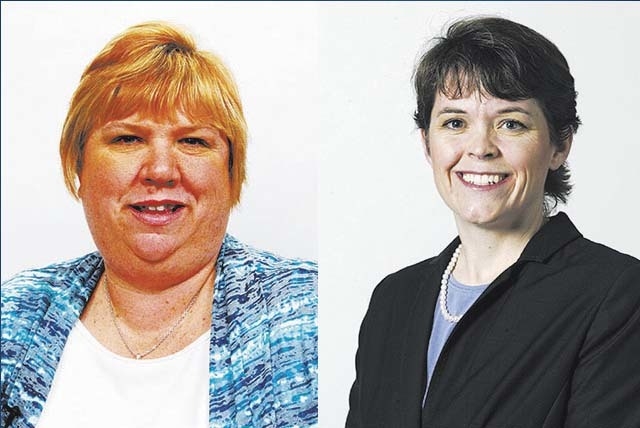New ethics complaints filed against two Clark County School Board members

Mere minutes after two Clark County School District officials reached an agreement on Wednesday with the Nevada Commission on Ethics over violations of state law, similar complaints were lodged against two other Clark County School Board members.
Both new complaints will likely clear the evidence requirements for a review of the elected leaders, said commission Executive Director Caren Cafferata-Jenkins. Local resident Joe Spencer filed the new complaints accusing School Board members Deanna Wright and Erin Cranor of using taxpayer resources to campaign in an election, which is prohibited by state law.
Spencer is a single parent of a district elementary school student, having moved to the Las Vegas area last school year from Santee, Calif. There, he served on several school district committees and was vice president of the Santee School District Foundation. Seeking involvement here, Spencer said he reached out to Wright, who is his board member.
“I was surprised to see what happens here,” he said on Friday, pointing to the two October 2012 emails at the heart of his complaint.
The email blasts sought volunteers to drum up support for Clark County School District’s ballot question. The initiative would have increased property taxes by 21 cents per $100 of assessed valuation, generating an estimated $669 million over six years for school improvements and construction. It failed after 66 percent of voters rejected it.
Wright and Cranor each signed one of the campaign emails. That, in itself, is not a problem.
As Wright wrote in her email, School Board members are “able to advocate on behalf of important issues affecting our students.” State law tells School Board members to advocate for the best interest of their students.
But state law also says they can’t use taxpayer resources to do so. Wright and Cranor had district staff send the emails in question. Wright’s message was mass emailed by district office supervisor Loreasa Nary, and Cranor’s email was sent by secretary Norma Herrera, according to the sender lines. Nary earned a base salary of $40,000 from the district, and Herrera earned a $56,000 base salary.
The same action during the same election put School Board President Carolyn Edwards in the cross hairs of the commission. In October 2012, Edwards directed a district employee to send an email blast seeking volunteers to “distribute door hangers and yard signs to registered voters encouraging them to support Question 2.”
The commission denied Edwards’ request for dismissal and subpoenaed witnesses in preparation for a full-blown hearing Wednesday. But Edwards, who originally challenged the complaint using a $330-per-hour attorney paid for by the School District, changed course and offered a settlement. The commission accepted the settlement Wednesday, acknowledging that Edwards broke the law but recommended no discipline, claiming the violation was “unwillful” because a district attorney advised her it was OK.
Edwards’ attorney, with the firm of Hutchison &Steffen, cost taxpayers about $30,000. The School Board has its own attorney but hired outside counsel for Edwards to avoid conflicting interests.
Spencer expects Edwards’ slap on the wrist to be repeated with her colleagues.
“Based on what I saw, I don’t have a lot of hope. Something should be done though,” he said, pointing to the lawyer who advised illegal actions. “Why isn’t this turned on the attorney who should know the law. State law was broken. Somebody should be held accountable.”
Still, Spencer has a little hope that the commission will see a few sentences in Wright’s email and not settle for an apology.
Wright’s email directed volunteers willing to campaign in support of Question 2 to call the district’s Community and Government Relations office at 799-1080. Edwards’ email included the same reference. Officials seemed to have used district offices as a headquarters, which is a more blatant violation than just using a secretary to send an email, said Martin Dean Dupalo, president of the Nevada Center for Public Ethics.
Wright’s email also included something not mentioned in Edwards’ email. It’s a web address where volunteers are urged to sign up for efforts supporting the property tax increase. The web address was part of the district’s website, www.ccsd.net.
“It goes far beyond a ‘single, unwillful violation,’” said Spencer, quoting the settlement awarded Edwards and Associate Superintendent Joyce Haldeman on Wednesday. Haldeman heads the Community and Government Relations office mentioned in Wright’s and Edwards’ emails. Haldeman authorized transporting, storing and dispersing pro-Question 2 campaign materials to volunteers using district vehicles, manpower and buildings.
Wright couldn’t be reached for comment on Friday. Cranor declined to comment until she sees the complaint.
If the commission finds sufficient evidence to investigate, it will notify Wright and Cranor, giving them 30 days to respond.
Contact reporter Trevon Milliard at tmilliard@reviewjournal.com or 702-383-0279.












